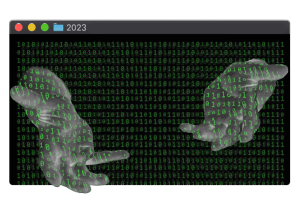How can we use ChatGPT correctly?
March 6, 2023
Artificial Intelligence has become synonymous with dystopian, robot-controlled futures and computers who become alive and begin attacking. But in reality, our future alongside AI is not that bleak. If used responsibly in a controlled environment, AI can enhance and transform the way we live.
As ChatGPT and other AI-driven technology becomes more involved in our day-to-day lives and its database of information continues to grow, it’s important to understand how we can work with it and use it to our advantage.
While the official website for ChatGPT is currently blocked on West Essex chromebooks, administrators say the school understands it’s not feasible to keep students from it forever. Its prominent presence is better utilized as a learning opportunity.
“My plan is not to keep it blocked from your Chromebooks indefinitely,” principal Caesar Diliberto said. “Eventually, we’re going to have to navigate it in a real way and open it up.”
Many students agree that ChatGPT should not be banned from school for good; 65.8% of students vote that ChatGPT and other AI should be accessible in school.
“To keep with the times and help students learn at an accelerated pace, we should allow and actively encourage students to use their resources such as ChatGPT as effectively as they can,” a student poll-respondent said.
Navigating this rise in AI will have many challenges, but as long as ChatGPT becomes a tool to enhance rather than a crutch, it won’t be as scary as it seems.
As with any new tool, there will be a learning curve in understanding when to use ChatGPT and when not to. But figuring out when its use is appropriate is part of the way that AI is going to change our minds for the better.
“I think students should just know what it is best suited for,” AP Computer Science teacher Dean Ratajczak said. “But I think that just makes you a better thinking, a better learner, a better individual: to know and be able to decide what’s most appropriate.”
Of course, ChatGPT should not be used in place of completing work, but for more mundane tasks or complicated questions, it can make topics easier for students to digest and understand. It can make complex concepts simpler without becoming a substitute for thinking. Many at West Essex agree.
“We all have calculators readily at hand, but I don’t think they have replaced the need for learning multiplication tables,” said Mike Johnson, district network administrator. “I see ChatGPT in this way.”
“Because of all the knowledge it has and the algorithms that it has created, it can solve something way faster than the human mind can,” Ratajczak said.
And not to be overlooked, ChatGPT can be fun. It can serve as an instant search engine that can provide quick answers to serious and frivolous questions alike, eliciting a quick laugh and jaw drop at the incredible sight of a computer spitting out human-like answers in a split second.
AI isn’t new, and it surely isn’t going anywhere; we’ve seen its influence in art, photography and more. ChatGPT is only the next technology in a conveyor belt of inventions that will transform the future of education and the workplace. While it may seem scary at first, we must see AI for what it is: innovation. Innovation that is going to require us to think differently about the jobs and tasks we assign. But also, innovation that is going to change the way we live, with the potential to streamline processes and solve problems in ways that we never thought possible before.


